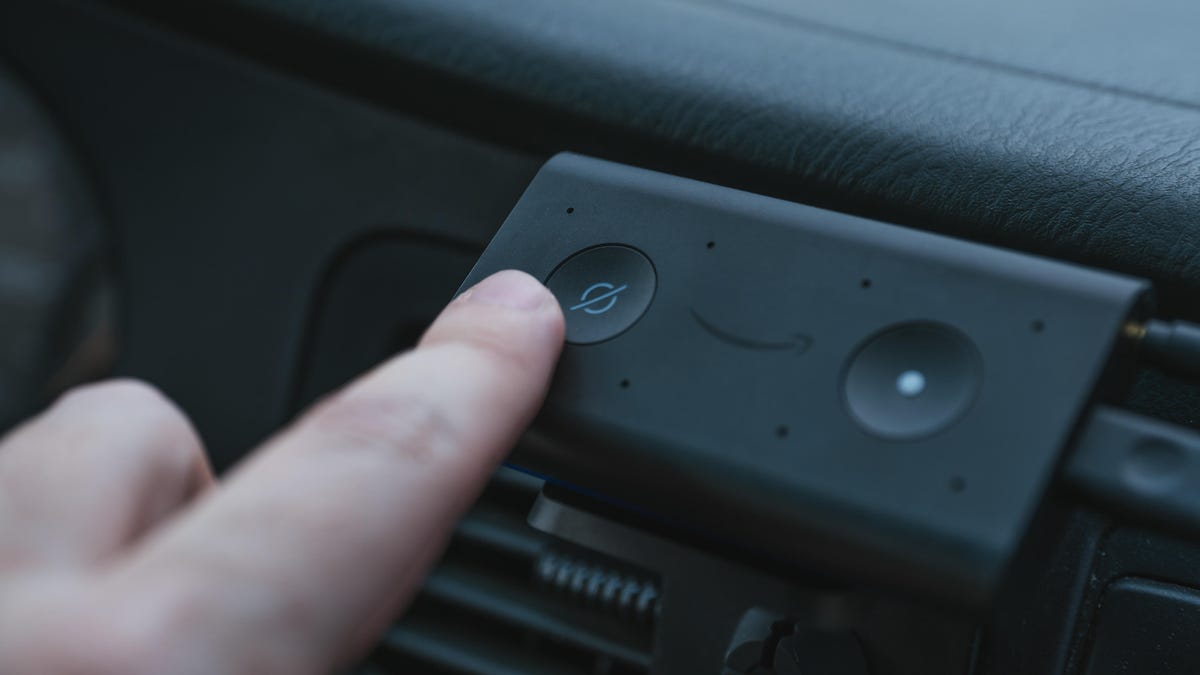 Why You Can Trust CNET
Why You Can Trust CNET Do you need Alexa or Google Assistant in your car?
Here's the idea behind a puzzling tech category.

I'm not sure you need Alexa , Google Assistant , or Siri in your car beyond their integration in your phone, but here's a look at the proposed raisons d'etre for the new dedicated in-car versions of each of them.
The new car 'speakers'
Amazon's Echo Auto brings Alexa voice control to your car for things like navigation, music playback, smart home control or anything else you use Alexa for on a home speaker or via the Alexa app on your phone. Echo Auto does not integrate into your car's electromechanical systems, however. That would be the domain of Alexa when installed from the factory by a carmaker, giving them ability to reach into the car's systems via the Alexa Auto SDK. This device doesn't do that.
The Amazon Echo Auto is a distinctively shaped device that can add a sophisticated microphone array to your on-the-road chats with Alexa.
The Anker Roav Bolt (left) and the JBL Link Drive.
The Anker Roav Bolt and JBL Link Drive bring Google Assistant smart voice tech to your car in the same manner as we just laid out with Echo Auto. Aside from the assistant these two devices connect to, the main difference between them and Echo Auto is that their design is that of a phone charger, dispensing with the messy power cable needed to run an Echo Auto. On the other hand, Echo Auto's bulkiness affords room for more microphones and a nice big mute button.
Unlike the Roav Bolt, the JBL Link Drive only offers a garden-variety, 2.1-amp USB charger.
These speakers have no speaker
Not really, anyway. The Echo Auto has a tiny speaker inside just for setup messages; Once it's running, it uses the speakers in your car. The Anker and JBL products have no internal speaker at all, relying entirely on your car's speakers and amplifier once they are set up. This is the first clue that these products may be superfluous, since your phone is probably already using your car's speakers to bring you a voice assistant. But then there are the microphones.
Better microphones
This may be these devices' ace in the hole: All of them extol the number, type and processing of their internal microphones. Amazon has eight of them, JBL and Anker only have one or two, but use them with "echo-canceling" "360-degree" "advanced on-device signal processing" so you, hopefully, only have to say something once.
The Roav Bolt has two microphones alongside the familiar Google Assistant status lights.
As with all car audio, the need for and improvement of mic performance will be dependent on the cabin design of your specific car. That makes a hard, quantitative evaluation of these device's microphone arrays nearly impossible.
Help for older cars
All of these devices include an auxiliary-out jack that lets you pipe their audio to your car's stereo with a cable, in case your car doesn't have Bluetooth .
Alongside the Echo Auto's power port is an auxiliary jack that can send audio out to your car stereo in the absence of Bluetooth to handle that task. Bonus: The audio is better over aux than Bluetooth.
Such Bluetooth-to-aux bridges aren't new but they can be very handy when you want to wirelessly bridge your modern phone to your older car stereo without a cable. Another way to make that connection is to install a high-quality Bluetooth FM modulator and avoid a snarly aux cable.
Where's Siri?
Apple doesn't license external Siri adapters like Amazon and Google do. Siri in the car either comes directly from your iPhone or through your car's Siri Eyes Free technology as installed by Toyota, Honda, Fiat Chrysler and other automakers.
Buy one or not?
Buy one of these only if you've wished for a matrix of these features:
- Better microphones because you have trouble getting your phone to pick up your voice.
- Wireless audio from your phone to the stereo of a car that only has an auxiliary jack.
- A fast charger in your car (Anker Roav Bolt only)
If two or three of the above aren't interesting to you, keep moving -- nothing to see here.

